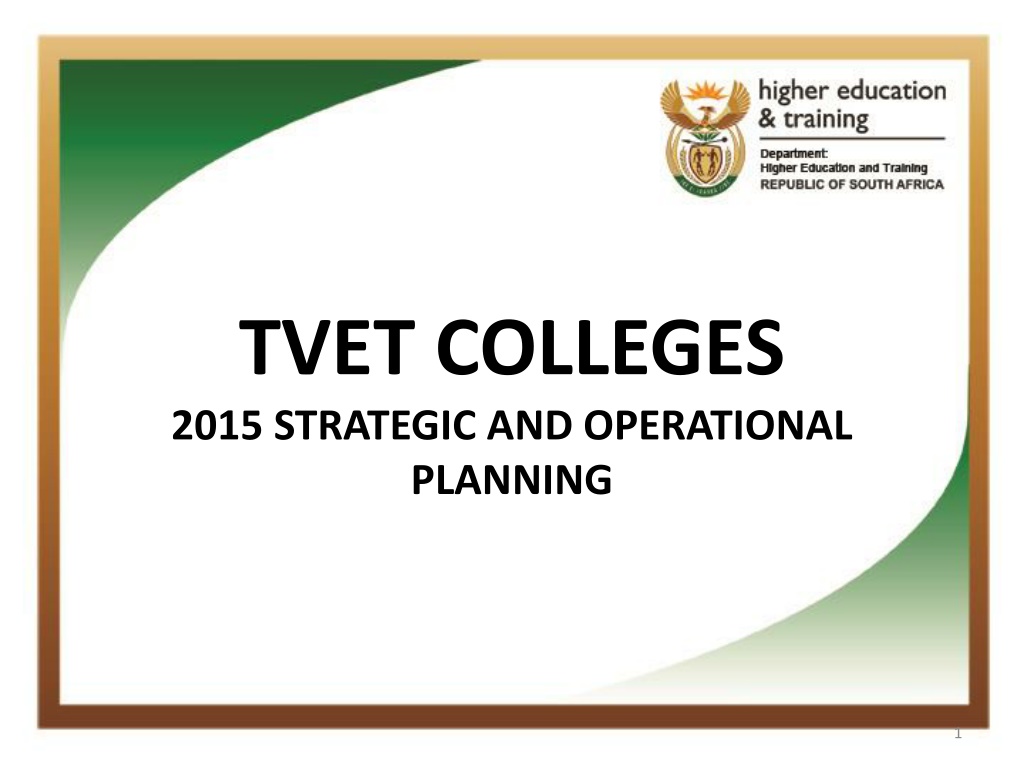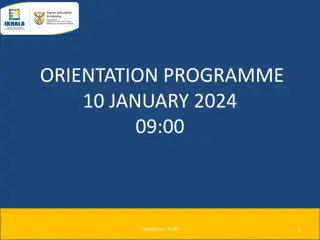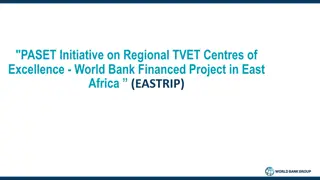Financial Planning Guidelines for TVET Colleges
Effective financial planning for TVET colleges involves careful consideration of cash flow, income sources, expenditure, reserves utilization, program costing, and adherence to financial policies. Emphasizing the need for reserves for capital expansion, monitoring DHET expenditures, and implementing sound corporate governance practices are key elements highlighted in the guidelines.
Download Presentation

Please find below an Image/Link to download the presentation.
The content on the website is provided AS IS for your information and personal use only. It may not be sold, licensed, or shared on other websites without obtaining consent from the author. Download presentation by click this link. If you encounter any issues during the download, it is possible that the publisher has removed the file from their server.
E N D
Presentation Transcript
TVET COLLEGES 2015 STRATEGIC AND OPERATIONAL PLANNING 1
Financial planning Effective planning is underpinned by the financial capability of College. Cash-flow forecast is pivotal for financial planning. Total monthly income (DHET subsidies, student fees, NSFAS, Occupational / skills income) including PERSAL budget at DHET) Less: Total monthly expenditure (Operational expenditure, College payroll and DHET payroll expenditure) = Available cash-flow Planning should be executed within the financial capability of the College taking into account available cash-flow and potential reserves. 2
Financial planning Only plan for a budget deficit when reserves are available for utilization. Reserves should primarily be applied for capital expansion and not for operational costs. It is critical to monitor DHET PERSAL spent monthly in order to predict potential savings. Savings to be released by DHET based on funding norms requirements and National Treasury approval. Segment reporting will be requirement for TVET Colleges going forward. New Standard Chart of Accounts (SCoA) to be developed to split segments between ministerial and occupational programmes. Ministerial programme funds may not subsidize occupational programmes. This will be monitored by DHET going forward. 3
Financial planning Occupational programmes must be costed (all inclusive cost) by the TVET Colleges and must indicate financial viability to render the programme. Capital infrastructure expansion must only be budgeted for based on available reserves and sound cash-flow forecasts. Frequent reporting on cash-flow position and cash- flow forecast to Accounting Officer and Council via the Finance and Executive Committee. Student debt (excluding students qualifying for financial assistance) should be recovered. Debt write-off only when all avenues have been exhausted Council approval required. 4
Financial planning Sound corporate governance has to be embedded in all College processes. This must be enforced through the adherence to policies and procedures. DHET will issue standardized financial policies for adoption by College Councils during July 2015. Supply Chain Policy approved by Director-General for immediate adoption and implementation by all TVET Councils. Although Colleges are not regulated via the PFMA, DHET has adopted the approach to recommend PFMA and National Treasury Regulations as best practice to the Colleges. 5
Financial planning PFMA requirement is strengthened through DHET requirement: Section 38(1)(J) confirmations required before funds may be transferred Accounting Officer confirms effective and transparent financial systems and controls at TVET College. Auditor-General will be auditing all 50 TVET s by 2017. Currently auditing 16 in 2015. 30 TVET s by 2016 50 TVET s by 2017 DHET Monthly reporting TVET Colleges required to comply with monthly reporting deadlines. TVET Colleges funding norms are under review by Ministerial Committee published in Govt Gazette 6
TVET COLLEGE BUDGET ALLOCATION 2014/15 2015/16 % share Eastern Cape 838 630 000 879 951 000 14% Free State 389 424 000 410 955 000 7% Gauteng 1 364 872 000 1 447 975 000 23% KwaZulu-Natal 1 033 932 000 1 099 995 000 18% Limpopo 657 723 000 700 604 000 11% Mpumalanga 413 864 000 439 830 000 7% Northern Cape 94 427 000 101 368 000 2% North West 314 409 000 334 768 000 5% Western Cape 719 892 000 764 128 000 12% TOTAL Avg Baseline Growth Rate from 2014 to 2015 5 827 173 000 6 179 574 000 100% 6.0% 7
TVET COLLEGE BUDGET ALLOCATION TVET Budget Allocations 2% 5% 7% 24% Gauteng 7% KwaZulu-Natal Eastern Cape 11% Western Cape 18% Limpopo Mpumalanga Free State 12% North West 14% Northern Cape 8
Budget Allocation TVET Colleges The Budget Allocation is determined in terms of the Norms and Standards for funding TVET Colleges It consists of the following: Compensation of Employees for all TVET Colleges appointed to offer Ministerial approved programmes (NCV and Report 191) Operational costs for the TVET Colleges Goods and Services costs for Regional TVET Units From 2015/16, the CoE budget allocation has been retained by the Department to enable payment of salaries relating to staff rendering duties in ministerial approved programmes. This is attributable to the function that has moved to the Department starting 01 April 2015. 9
TVET COLLEGES BURSARY ALLOCATION 2014/15 2015/16 % share Eastern Cape 227 212 000 237 981 000 11% Free State 148 253 000 154 665 000 7% Gauteng 467 933 000 488 707 000 22% KwaZulu-Natal 447 349 000 467 891 000 21% Limpopo 281 502 000 294 618 000 13% Mpumalanga 129 184 000 135 107 000 6% Northern Cape 43 215 000 45 182 000 2% North West 135 579 000 141 667 000 6% Western Cape 227 510 000 238 182 000 11% TOTAL Avg Baseline Growth Rate from 2014 to 2015 2 107 737 000 2 204 000 000 100% 6% 10
TVET COLLEGES BURSARY ALLOCATION TVET Bursary Allocations 2% 6% 7% 22% Gauteng 7% KwaZulu-Natal Limpopo Western Cape 11% Eastern Cape 21% Free State North West 11% 13% Mpumalanga Northern Cape 11
Bursary Allocation for TVET Colleges The Bursary Allocation for TVET Colleges consists of the following: Tuition Fees ; and Allowances (Transport and Accommodation) This form of funding is channeled through NSFAS NSFAS pay TVET Colleges on a claim basis 12
Calculation of 63% by DHET In terms of the Norms for Funding TVET Colleges: 63% is earmarked for CoE, also approved by the Minister. 63% CoE will be based on 100% programme costs (Thus DHET 80% programme fund as well as 20% student fees). DHET therefore retain 63% of the TVET Budget as follows: 63% of DHET TVET Budget; and 63% of 80% of TVET NSFAS Allocation (Retained from DHET TVET Budget) Total budget retained by DHET: 81% of DHET TVET Budget 13
Implication of budget retention by DHET Direct implication of 81% Budget retention by DHET: DHET transfers has decrease by 36% from 2014 allocations. Colleges will be highly dependent on NSFAS Claims and student fees for operational cash-flow purposes. It will be critical to submit quality claims to NSFAS in order to receive timeous payment lack of quality claims will lead to rejections by NSFAS and implicate cash-flow for the Colleges. 14
DHET subsidy payments TVET College subsidies will be paid in 3 tranches as follows: 50% paid in April 2015; 25% in September 2015; and 25% in January 2016. 15
Thank you 16























